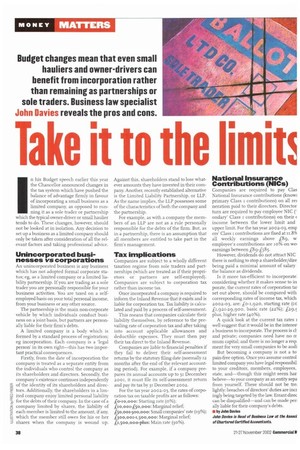Tate it to the Ii
Page 38

If you've noticed an error in this article please click here to report it so we can fix it.
Budget changes mean that even small hauliers and owner-drivers can benefit from incorporation rather than remaining as partnerships or sole traders. Business law specialist John Davies reveals the pros and cons.
n his Budget speech earlier this year the Chancellor announced changes in the tax system which have pushed the balance of advantage firmly in favour of incorporating a small business as a limited company, as opposed to running it as a sole trader or partnership whidi the typical owner-driver or small haulier tends to do. These changes, however, should not be looked at in isolation. Any decision to set up a business as a limited company should only be taken after consideration of all the relevant factors and taking professional advice.
Unincorporated businesses vs corporations
An unincorporated business is any business which has not adopted formal corporate status; eg, as a limited company or a limited liability partnership. If you are trading as a sole trader you are personally responsible for your business activities. You are taxed on a selfemployed basis on your total personal income, from your business or any other source.
The partnership is the main non-corporate vehicle by which individuals conduct business on a joint basis, but partners are personally liable for their firm's debts.
A limited company is a body which is formed by a standard process of registration; eg incorporation. Each company is a 'legal person' in its own right—this has two important practical consequences.
Firstly, from the date of incorporation the company is treated as a separate entity from the individuals who control the company as its shareholders and directors. Secondly, the company's existence continues independently of the identity of its shareholders and directors. Additionally, the shareholders in a limited company enjoy limited personal liability for the debts of their company. In the case of a company limited by shares, the liability of each member is limited to the amount, if any, which the member still owes for his or her shares when the company is wound up. Against this, shareholders stand to lose whatever amounts they have invested in their company. Another, recently established alternative is the Limited Liability Partnership, or LLP. As the name implies, the LLP possesses some of the characteristics of both the company and the partnership.
For example, as with a company the members of an LLP are not as a rule personally responsible for the debts of the firm. But, as in a partnership, there is an assumption that all members are entitled to take part in the firm's management.
Tax Implications
Companies are subject to a wholly different taxation regime from sole traders and partnerships (which are treated as if their proprietors or partners are self-employed). Companies are subject to corporation tax rather than income tax.
Once incorporated a company is required to inform the Inland Revenue that it exists and is liable for corporation tax. Tax liability is calculated and paid by a process of self-assessment.
This means that companies calculate their liability themselves, by reference to the prevailing rate of corporation tax and after taking into account applicable allowances and deductible expenses. They must then pay their tax direct to the Inland Revenue.
Companies are liable to financial penalties if they fail to deliver their self-assessment returns by the statutory filing date (normally 12 months after the end of the relevant accounting period). For example, if a company prepares its annual accounts up to 31 December 2001, it must file its self-assessment return and pay its tax by 31 December 2002.
For the tax year 2002-03, the rates of corporation tax on taxable profits are as follows: Lo-to,000: Starting rate (o%); Po,o01-£5o,000; Marginal relief; Lso,00p300,000: Small companies' rate (19%); b00,00i-1,500,000: Marginal relief; Asoo,000-plus: Main rate (30%).
National Insurance Contributions (NICs)
Companies are required to pay Clas National Insurance contributions (knowi primary Class t contributions) on all rei neration paid to their directors. Director turn are required to pay employee 1%11C (' ondary Class i contributions) on their income between the lower limit and upper limit. For the tax year 2002-03, emp ers' Class i contributions are fixed at n.89s all weekly earnings above £89, w employee's contributions are io% on wet earnings between /89-£385.
However, dividends do not attract NIC there is nothing to stop a shareholder/dire being paid a minimal amount of salary the balance as dividends.
Is it more tax-efficient to incorporate: considering whether it makes sense to in porate, the current rates of corporation tai set out above, should be compared with corresponding rates of income tax, which 2002-03, are: £0-1,920, starting rate (re £1,921-29,900, basic rate (22%); £29,s plus, higher rate (40%).
A quick look at the current tax rates well suggest that it would be in the interesi a business to incorporate. The process is d and private; companies need have no rr mum capital; and there is no longer a raqi ment for very small companies to be audi
But becoming a company is not a to pain-free option. Once you assume control limited company you have legal responsibil to your creditors, members, employees, state, and—though this might seem bar believe—to your company as an entity sepa from yourself These should not be tre; lightly: breaches of directors' duties are trier ingly being targeted by the law. Errant direc can be disqualified—and can be made per ally liable for their compl lay' s debts.
III by John Davies
John Davies is Head of Rosiness law at the Assoc of Chartered Rental( I Accountants.




























































































































































